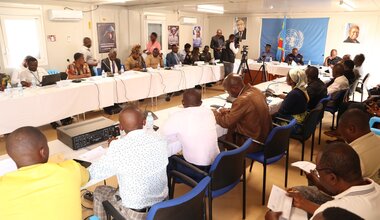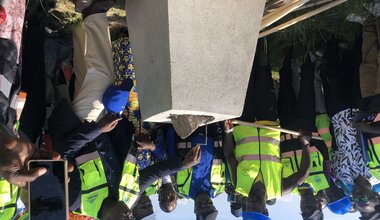Women Peacekeepers Play a Unique and Critical Role in the DRC
Veiled by the heated sun and surrounded by the lush green landscape of Kiwanja Valley in North-Kivu, thirty-one Moroccan peacekeepers stood to attention in a seamless line, as they awaited to receive their Medals of Honor. As birdsong entwined with the chorus of the Democratic Republic of the Congo’s national anthem, a sentiment of pride, courage and honor filled the air of that day in September 2022.
Amongst the line of young and well-experienced men, two women’s salutes gathered the attention of onlookers, for they reflected hope in a relentless joint pursuit of men and women across the world to ensure women’s representation in peace and security.
As of December 2021, women constitute 7.8 percent of all uniformed military, police, justice and corrections personnel in United Nations field missions: an increase of 6.8 percent since 1993. Despite the progress, the UN is still far behind the targets of 20 percent women for individual police officer positions and 30 percent for justice and corrections government‐provided personnel.
Major Soumia Badi, Head of the Female Engagement Team (FET) of the Moroccan Rapid Deployment Base (MORRDB), shared a bright smile as the Special Representative of the Secretary-General and Head of MONUSCO, Ms Bintou Keita, placed a medal of honor on her apparel: one which recognized her bravery and sacrifice.
“It was a great honor and a proud moment for me and my country when I was awarded an appreciation certificate [and medal] from the SRSG,” Major Badi stated. Previously a social worker in Agadir, Morocco, and an Assistant Officer in the Hassan II Foundation for Retirees, Major Badi brought with her a significant knowledge, experience and skills in social issues and working with people.

“As a social worker, I must assist vulnerable people regardless of their origin, color, religion or nationality. Serving outside my country has been a great experience,” she continued.
Women are essential to the effectiveness of peacekeeping: they have greater access to communities through women and children, they help in promoting human rights and the protection of civilians and encourage women to become a part of peace and political processes. Through women’s diverse sets of skills in decision-making and planning and results, as well as their ability to build trust and confidence within communities, women are paramount to successful peacekeeping.
However, there are indeed obstacles to overcome to ensure the effectiveness of women’s expertise in peacekeeping, particularly in the Congolese context: “Communication with the local population can be difficult, especially with those who do not speak French. In such cases, a male linguistic assistant provides help, as we don't have a female translator. However, when it comes to sensitive subjects such as cases of sexual violence, for example, the victim [often] feels uncomfortable speaking to a man. In addition, during the anti-MONUSCO protests, most of our activities were haltered due to the deteriorating security situation in the region” she added.
With much support being provided to Major Soumia and the FET in their work, a sense of empowerment filtered through the Moroccan Base. “I have been able to succeed in my mission because of the advice and directive of the Colonel and the close collaboration I’ve shared with the members of the contingent,” Major Badi explained; “My greatest achievement is winning the trust of the population and encouraging women to break the silence and talk about their problems and dreams. It's very important for women to serve in the UN, to achieve gender equality and empower all women and girls.”
The UN is working to ensure the deployment of more women in uniformed functions through the Women, Peace and Security Agenda, the UN Security Council resolution 1325 (UNSCR1325), which advocates for the equal participation of women in all sectors of peacekeeping operations, and the Action for Peacekeeping (A4P) Declaration of Shared Commitments, through which the UN has called for an expansion of the role and contribution of women in its operations. However, the responsibility for the deployment of women in the police and military ultimately lies with the willingness and proactivity of Member States.

 UN
UN United Nations Peacekeeping
United Nations Peacekeeping






